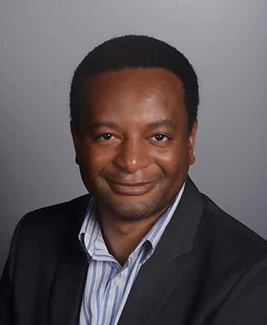Monitoring HIV drug resistance in Zimbabwe
20th Anniversary of Global Health Fellows and Scholars

Dr. Justen Manasa says he had to “grow up quickly” over the last few years. As a senior lecturer and biomedical scientist at the University of Zimbabwe and director of the University’s Innovation Hub, he watched COVID-19 take hold in the region and ultimately take the lives of two of his closest mentors, the late Drs. James Hakim and David Katzenstein. Both were highly regarded in their field Manasa says, “These were people whom I admired and looked up to my entire career, and almost overnight, I was thrust into a leadership position to try and fill their shoes.”
Manasa joined the Fogarty Global Health Fellows and Scholars program, now known as LAUNCH, through the program at the University of California Berkeley. Prior to his fellowship, Manasa had received support from Fogarty that allowed him to pursue his master’s degree in molecular virology through a partnership between Stanford Medical School and the University of Zimbabwe. While at Stanford, Manasa participated in SPARK, a translational research program that bridges academia and industry by identifying research products from the academic community that have the potential to be taken to market as therapeutics, diagnostics, or medical devices. Essentially, the program helps the academics who created these products transition to entrepreneurship. While at Stanford, Manasa began to study HIV drug resistance, which has been a research priority for him ever since.
In his Fogarty fellowship project, he focused on studying the increase in HIV drug resistance and providing equitable access to diagnostics to improve the effectiveness of treatment for patients. Monitoring HIV drug resistance is essential to determining how to improve treatment outcomes and which antiretroviral (ART) drugs to include in public health treatment regimens. Manasa’s project aimed to leverage the advances in sequencing and bioinformatics technologies to provide increased understanding of HIV drug resistance among patients in Zimbabwe.
Following these experiences, Manasa learned that the University of Zimbabwe planned to transition their educational system to focus not only on teaching research and community service but also on innovation and industrialization. Like the SPARK program, the Innovation Hub at the University of Zimbabwe fraw from academic research projects to develop products or services that have the potential to improve health. The hub then helps identify funding sources to transition the projects from academia to the market. Manasa knew this would be a natural fit for him.
Today, along with directing the Innovation Hub, Manasa serves as principal investigator for the
Enhancing Noncommunicable diseases (NCD) Research and Innovation Capacity or ENRICH program as well as a separate program focused on HIV genomics. With the long-term goal of generating evidence for interventions to improve care for people with NCDs in the region, ENRICH aims to train masters, PhDs, and post-doctoral candidates in Zimbabwe to be proficient NCD researchers.
Within his many roles, Manasa hopes to incorporate and implement what he learned from Drs. Hakim and Katzenstein. “One of the biggest lessons I learned working with them is that mentorship is key to the flourishing of trainees, and if you have good mentors as a trainee, you will flourish academically and in every other aspect of your life.”
These days Manasa is based in Lesotho, South Africa, where he continues his work to ensure that treatment for HIV remains equitable and accessible for patients throughout southern Africa as well as around the globe. In his free time, he is brushing up on his public health skills by pursuing a master's degree at the Harvard T. Chan School of Public Health. He is also working on a paper highlighting the impact that Fogarty programs have had on the research infrastructure in Zimbabwe.
More Information
Updated March 7, 2025
To view Adobe PDF files,
download current, free accessible plug-ins from Adobe's website.
Related World Regions / Countries
Related Global Health Research Topics